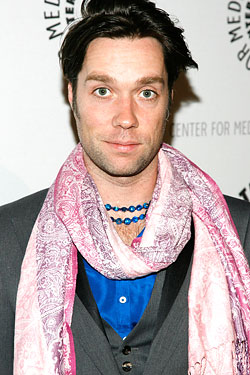
Is there anyone among us who doesn’t want to see Rufus Wainwright succeed? Sure, most would probably rather see him succeed at making another album like Poses than replicating famous Judy Garland performances, but since the guy gives better quotes than practically anyone outside of Dorothy Parker and Noel Gallagher, we’ll happily support any musical endeavor that puts him within interviewing distance of a reporter. So, how are the reviews for his new opera? Mixed! Prima Donna, which he was originally to bring to the Met (until they insisted he write the lyrics in English rather than French and he refused, hilariously), debuted at the Manchester International Festival on Friday, and the consensus is that it’s okay, mostly.
If we ever write an opera, we hope the Times’s Anthony Tommasini reviews it. This is one of the nicest pans we’ve ever read:
You had to salute Mr. Wainwright, who turns 36 this month, for playing up his moment and placing himself in the lineage of great opera composers. As a longtime admirer of his music, I wish I could report that “Prima Donna” fulfilled his ambitions for writing a fresh and personal new opera. He certainly brings deep talents and potential to the challenge. There are inspired touches and disarmingly beautiful passages in this mysterious, stylistically eclectic work … But Mr. Wainwright’s score and his attitude toward the drama often seem muddled, as if he were relying too much on his keen musical and theatrical instincts lest he overthink and impede his imagination.
In a polite, mixed-positive three-star review, the Guardian’s Alfred Hickling wishes Rufus could’ve just sung the whole damn thing himself:
Only William Joyner falls foul of Wainwright’s slight naivety as an opera composer, having been handed a punitively high-lying role. With his vast range, Wainwright himself probably sings it with ease, though he’ll have to accept that most tenors only go as far as C without recourse to an operation.
The Independent’s Lynne Walker doesn’t even try to soften the blows:
Musically Prima Donna is at best banal, at worst boring. The orchestral writing is lumpy, leaden and repetitive, so that the merest flash of inspiration — a dashing musical signature for example — is welcomed with relief as an original idea. Wainwright didn’t need to pay homage to all those dead composers he adores by including so many fragments of their scores in his own opera.
At least Bloomberg’s Warwick Thompson likes Rufus’s earlier work:
Wainwright is a talented pop star with a gift for penning hummable three-minute melodies. Perhaps, as he hinted in a recent television interview, a few composition lessons might not have been a bad idea when tackling something 147 minutes longer.
But the Financial Times’ Andrew Clarke very nearly saves the day with a late-breaking, four-star thumbs-up:
Here is a recipe for chutzpah: commission an opera from an operatic ingénu, perform it in a language that is foreign to the commissioning companies’ audiences and throw a ton of money at it. What do you get? Rufus Wainwright’s Prima Donna is neither a flop nor a waste of money. It’s a camp, endearingly sentimental homage to the art of the diva.
In conclusion, we’d still totally see this.




